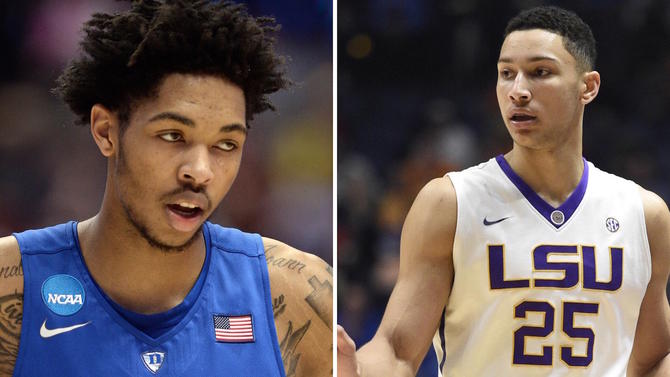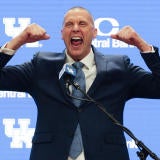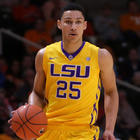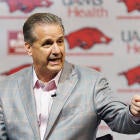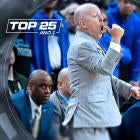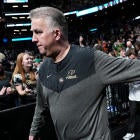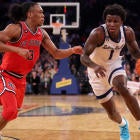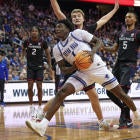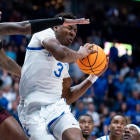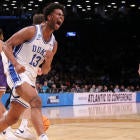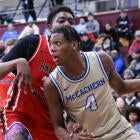Once again, we're running our annual NBA Draft Trends series. Every Wednesday leading up to the NBA Draft will feature a piece on both the college and professional angle of the draft to highlight patterns (and dispel some myths). Last week we started with an unprecedented turn of events in the lottery. That was kind of wild. Today's piece focuses not on the top pick, but the No. 2 choice.
Last year we looked at what the No. 1 pick in the lottery has produced and what teams can reasonably expect in terms of longevity with that pick.
So why not look at No. 2? There is a legitimate debate right now about Ben Simmons vs. Brandon Ingram. We get a 1 vs. 2 toss-up in most years. Some might forget, but the debate was fierce and true in '07 between Greg Oden and Kevin Durant. Heading into that draft, Oden was seen as the better prospect. And the strange thing about 2015 was how it was Karl-Anthony Towns vs. Jahlil Okafor ... and then D'Angelo Russell was taken by the Lakers at No. 2, something almost no one predicted just days before that draft.
As a refresher from last year, know this: On average, the No. 1 pick since 1985 lasts 6.6 seasons with his first team and in that span goes to 3.2 All-Star Games with the team that drafted him atop the board. In general, pretty solid.
The No. 2 pick is not nearly as reliable -- though far from bust material. Not including the past three years worth of picks, as they've only been in the league for such a short time, from 1985 through 2012, when Michael Kidd-Gilchrist was picked second by the Charlotte Bobcats, the average amount of seasons a No. 2 pick spends/starts his career with the team that drafted him: 4.7 years.
And in a lot of cases, like Jason Kidd, Marcus Camby, Tyson Chandler, Mike Bibby and Alonzo Mourning, those players hit their peak and produce the most with other teams. Often times for No. 2 picks, their first stop is a warm-up act.
So, yes, there is something to having value and the better prospect with the No. 1 pick, even if there are years (Durant v. Oden in 2007, LaMarcus Aldridge v. Andrea Bargnani in 2006, Gary Payton v. Derrick Coleman in 1990) where teams made the wrong choice in 1 v. 2.
In terms of the lifespan of a player's complete career, and not just with one team, No. 2s are doing just fine. The average career stat line of a No. 2 pick in the lottery era: 12.6 points, 5.7 rebounds, 2.5 assists, 16.1 PER, 28.3 minutes with an average career of 11.6 seasons.
If you can go more than a decade in the league, you're living well. So while many teams don't get return on investment, the players on the whole are doing well. And this average takes into account Jay Williams, who would've played in the NBA for years had he not seen his career end prematurely due to an off-court accident.
What I found most surprising: No. 2 picks are able to build out long, fairly productive careers on average ... but seldom become huge stars. Kevin Durant, Jason Kidd, Alonzo Mourning and Gary Payton are the exceptions. Durant is the only No. 2 pick in the lottery era to win an MVP award.
LaMarcus Aldridge, Marcus Camby, Tyson Chandler, Rik Smits: all really solid players but will any make the Hall of Fame? (We'll see what becomes of the likes of D'Angelo Russell and Jabari Parker.) Let's say one of them (Aldridge the most likely) does. That means five No. 2 picks in 31 seasons become all-time greats. Not a stellar ratio. But again, plenty of really good players there. In terms of All-Star appearances, it's not a great return.
The No. 2 pick is viewed as the desirable pick in most instances because no pressure or infamy comes with the choice (most often; we'll also remember Darko!). So whether it's Ingram or Simmons, statistically, history suggests that whomever goes first has a higher likelihood of playing in more All-Star Games, of being with his first team for a longer period of time, of building a Hall-of-Fame career.
No. 2 is nice, just not as nice. It's always a fun mystery, though. Will Ingram/Simmons become a win-win? That is the rare occurrence. Usually with top picks, if one player thrives, the other doesn't. The only time that's truly happened in the lottery era: 1992. Shaquille O'Neal went first, then Mourning. It's asking way too much of Simmons and Ingram to do that. What's guaranteed: These two will have their careers positioned and debated off each other for years and years. Ben Simmons vs. Brandon Ingram has become one of the bigger -- and fairly surprising -- toss-ups of the past 15 years.
